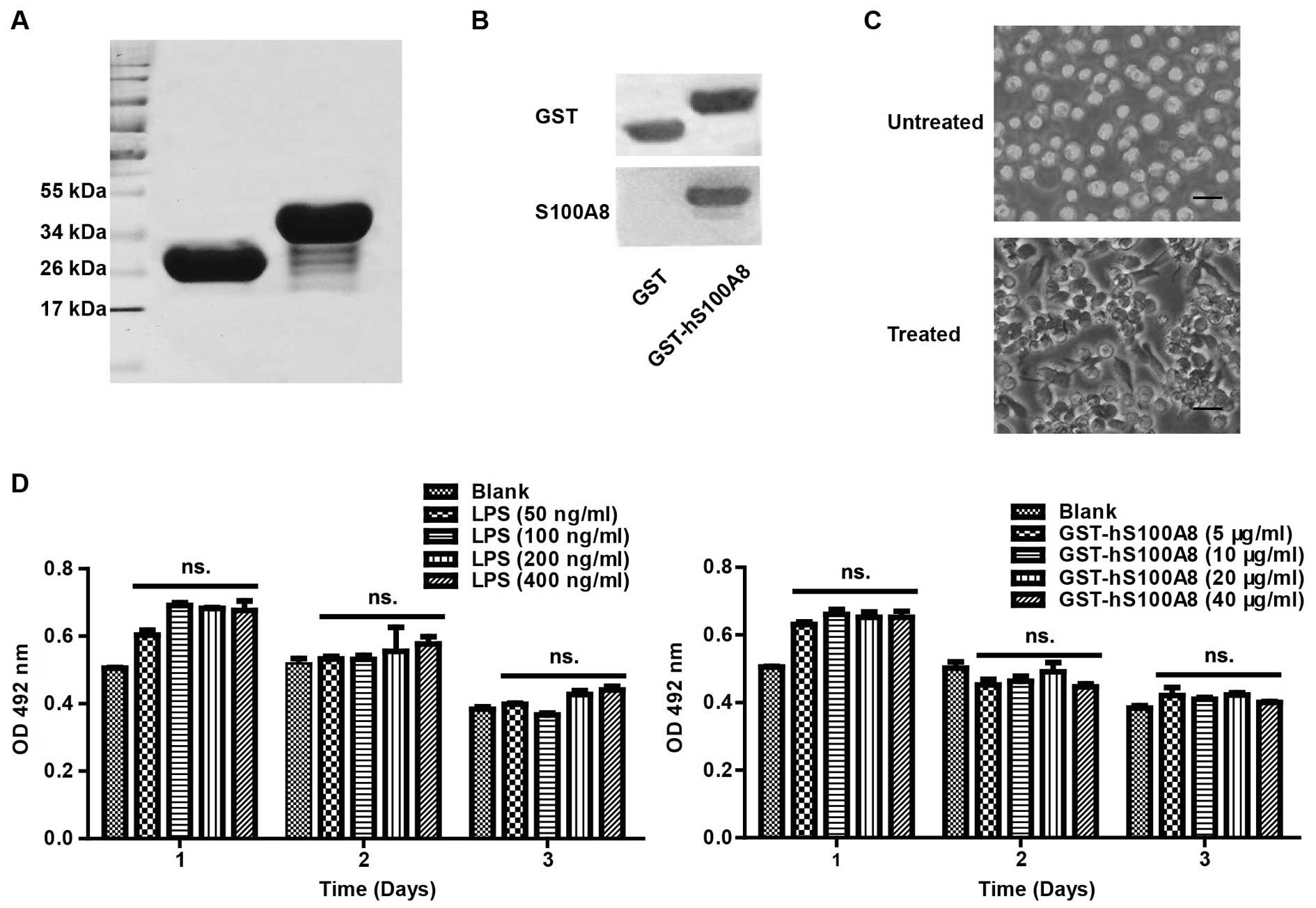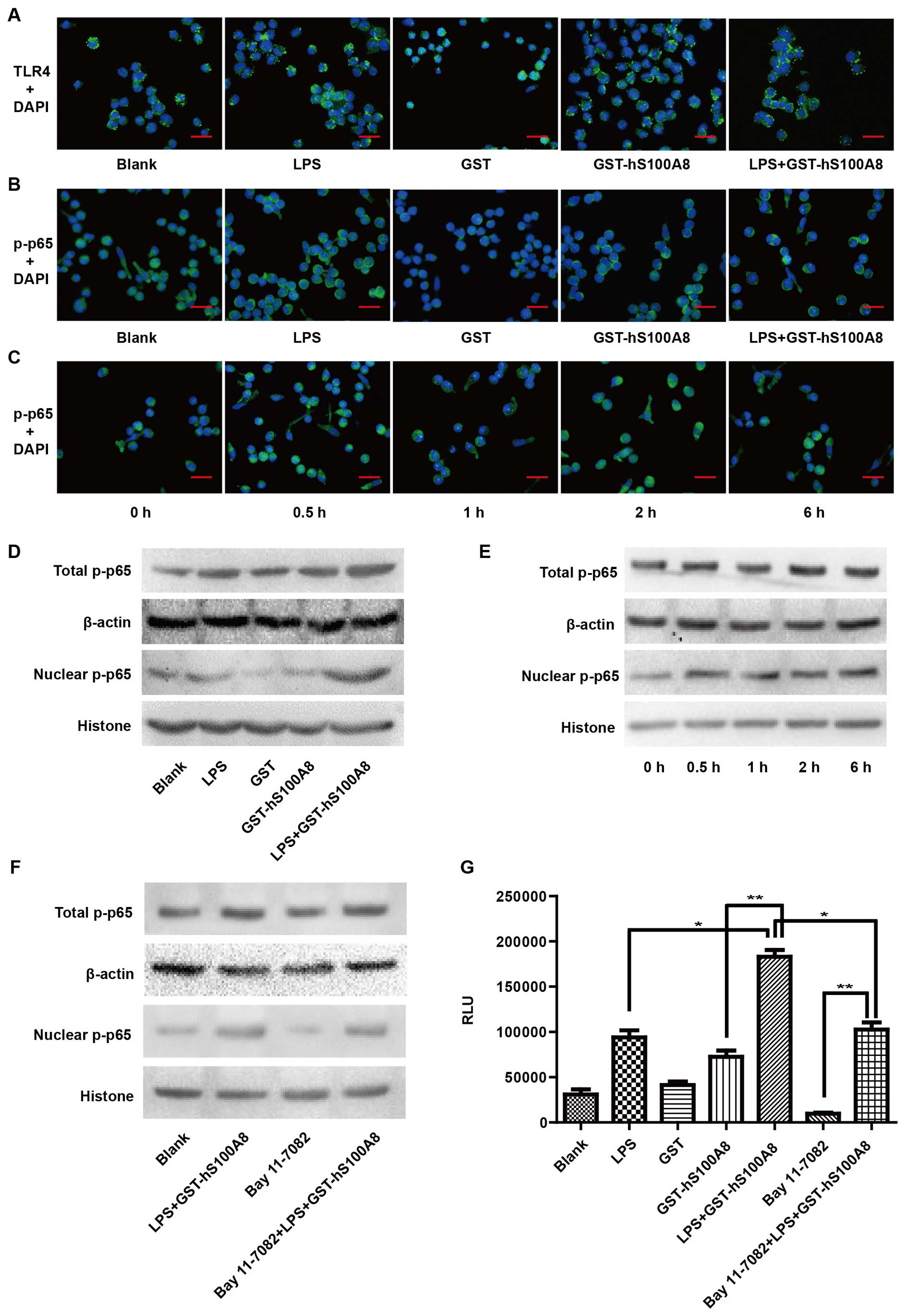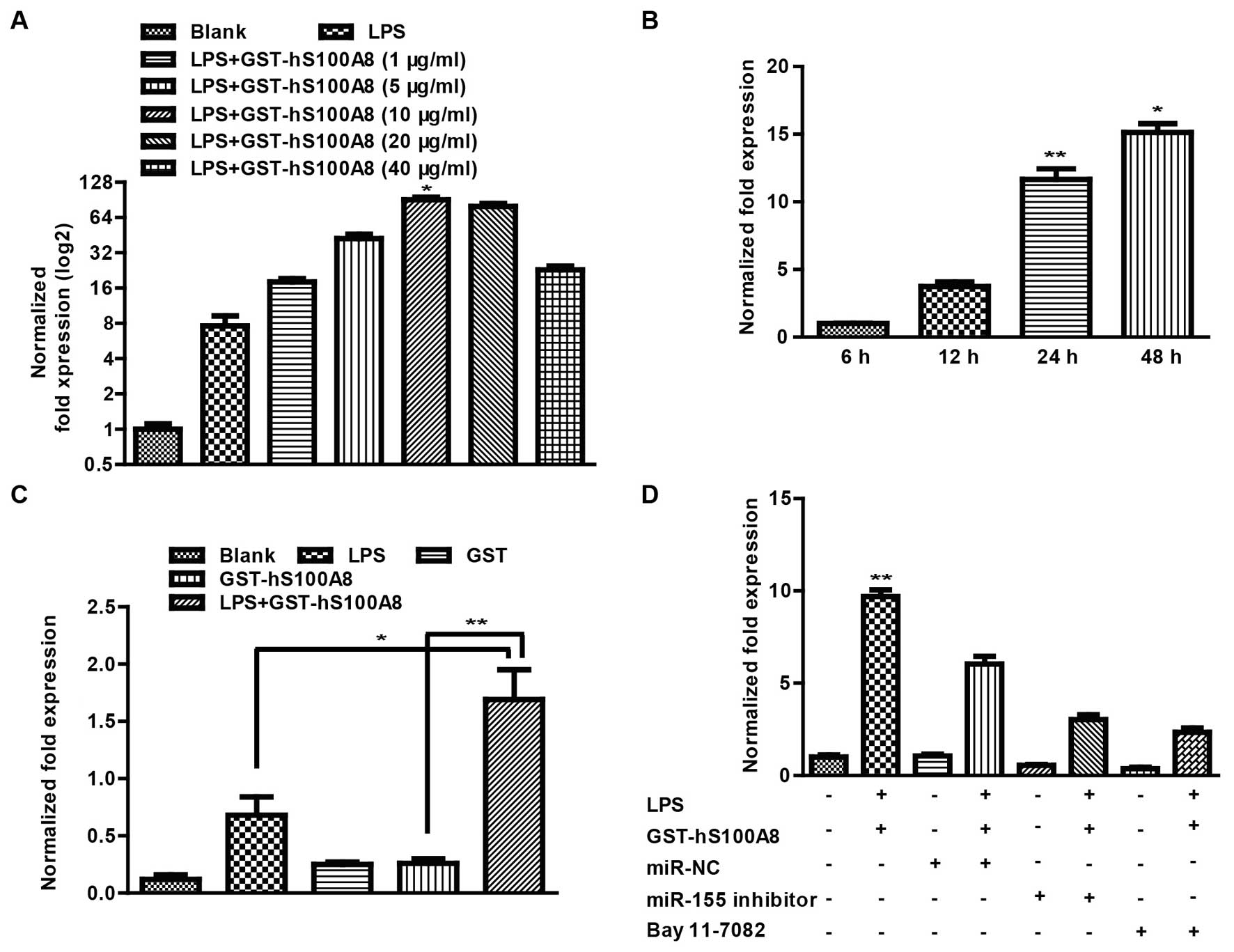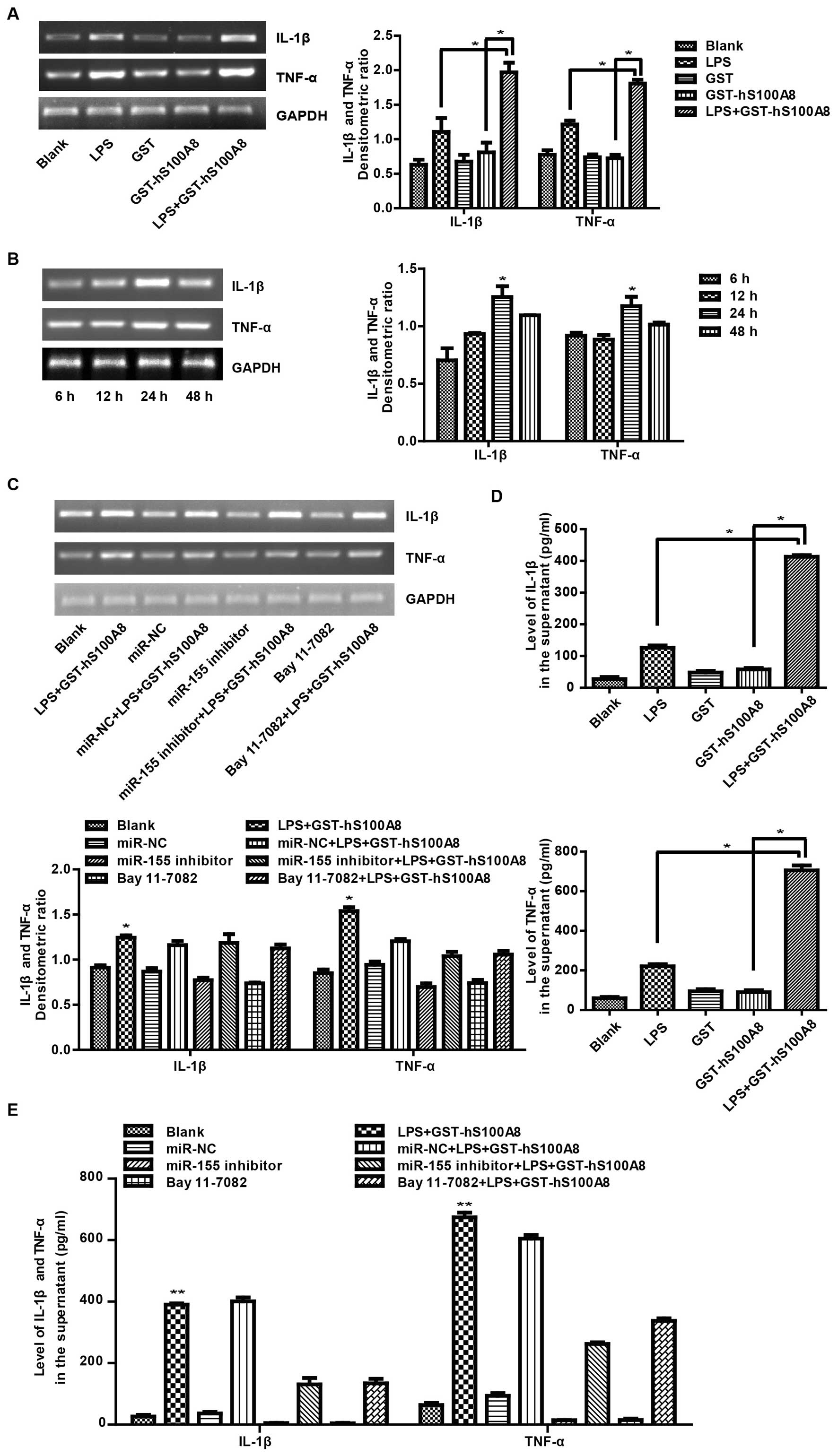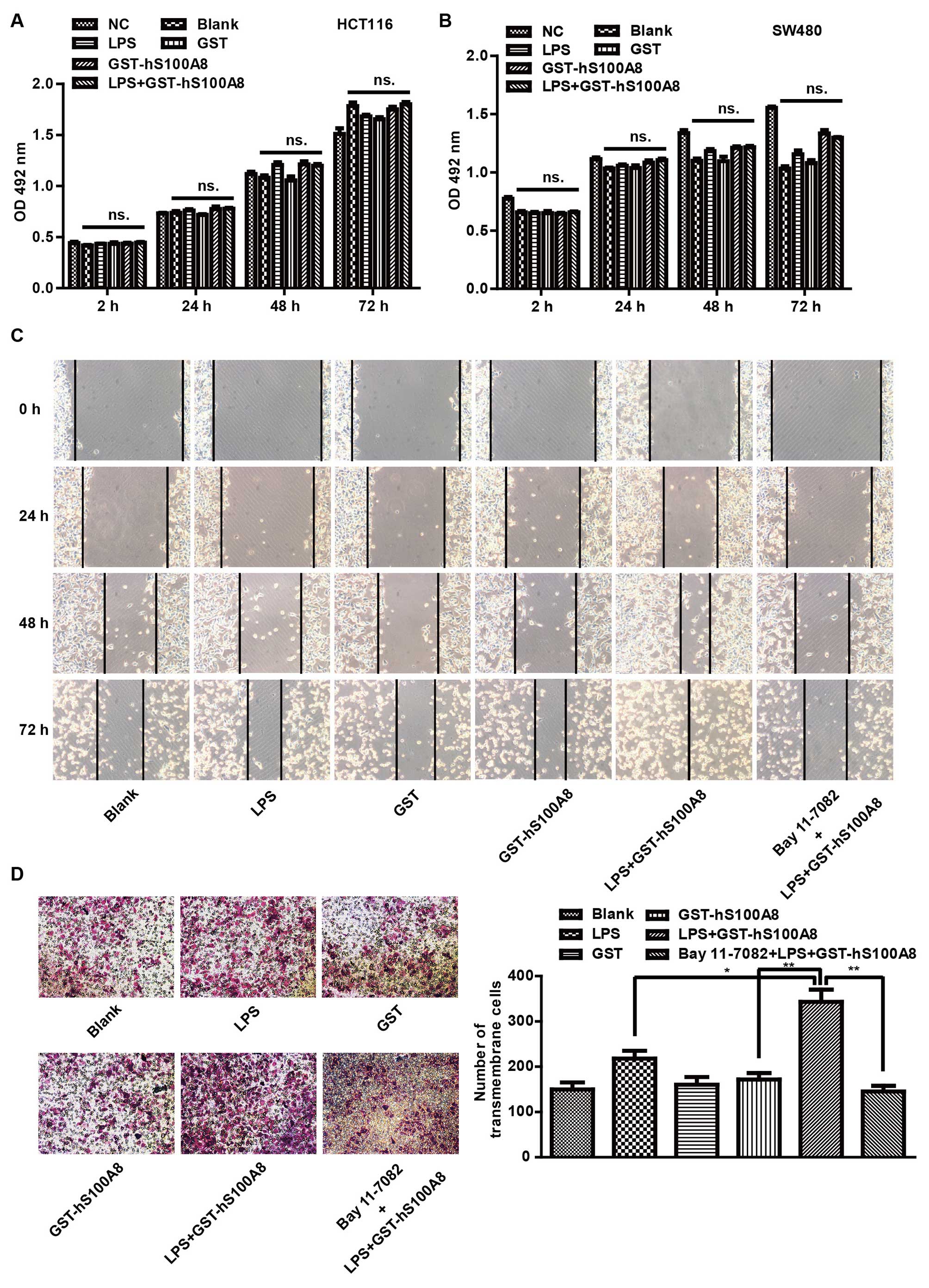|
1
|
Wang D, Fu L, Sun H, Guo L and Dubois RN:
Prostaglandin E2 promotes colorectal cancer stem cell expansion and
metastasis in mice. Gastroenterology. 149:1884–1895.e4. 2015.
View Article : Google Scholar : PubMed/NCBI
|
|
2
|
Van den Eynden GG, Majeed AW, Illemann M,
Vermeulen PB, Bird NC, Høyer-Hansen G, Eefsen RL, Reynolds AR and
Brodt P: The multifaceted role of the microenvironment in liver
metastasis: biology and clinical implications. Cancer Res.
73:2031–2043. 2013. View Article : Google Scholar : PubMed/NCBI
|
|
3
|
Wang W, Li X, Zheng D, Zhang D, Huang S,
Zhang X, Ai F, Wang X, Ma J, Xiong W, et al: Dynamic changes of
peritoneal macrophages and subpopulations during ulcerative colitis
to metastasis of colorectal carcinoma in a mouse model. Inflamm
Res. 62:669–680. 2013. View Article : Google Scholar : PubMed/NCBI
|
|
4
|
Morales C, Rachidi S, Hong F, Sun S,
Ouyang X, Wallace C, Zhang Y, Garret-Mayer E, Wu J, Liu B, et al:
Immune chaperone gp96 drives the contributions of macrophages to
inflammatory colon tumorigenesis. Cancer Res. 4:446–459. 2014.
View Article : Google Scholar
|
|
5
|
De Simone V, Franzè E, Ronchetti G,
Colantoni A, Fantini MC, Di Fusco D, Sica GS, Sileri P, MacDonald
TT, Pallone F, et al: Th17-type cytokines, IL-6 and TNF-α
synergistically activate STAT3 and NF-κB to promote colorectal
cancer cell growth. Oncogene. 34:3493–3503. 2015. View Article : Google Scholar
|
|
6
|
Jia XH, Feng GW, Wang ZL, Du Y, Shen C,
Hui H, Peng D, Li ZJ, Kong DL and Tian J: Activation of mesenchymal
stem cells by macrophages promotes tumor progression through immune
suppressive effects. Oncotarget. Mar 14–2016.Epub ahead of print.
View Article : Google Scholar
|
|
7
|
Vrakas CN, O'Sullivan RM, Evans SE, Ingram
DA, Jones CB, Phuong T and Kurt RA: The Measure of DAMPs and a role
for S100A8 in recruiting suppressor cells in breast cancer lung
metastasis. Immunol Invest. 44:174–188. 2015. View Article : Google Scholar
|
|
8
|
Chen B, Miller AL, Rebelatto M, Brewah Y,
Rowe DC, Clarke L, Czapiga M, Rosenthal K, Imamichi T, Chen Y, et
al: S100A9 induced inflammatory responses are mediated by distinct
damage associated molecular patterns (DAMP) receptors in vitro and
in vivo. PLoS One. 10:e01158282015. View Article : Google Scholar : PubMed/NCBI
|
|
9
|
Duan L, Wu R, Ye L, Wang H, Yang X, Zhang
Y, Chen X, Zuo G, Zhang Y, Weng Y, et al: S100A8 and S100A9 are
associated with colorectal carcinoma progression and contribute to
colorectal carcinoma cell survival and migration via Wnt/β-catenin
pathway. PLoS One. 8:e620922013. View Article : Google Scholar
|
|
10
|
Stulík J, Osterreicher J, Koupilová K,
Knízek, Macela A, Bures J, Jandík P, Langr F, Dedic K and Jungblut
PR: The analysis of S100A9 and S100A8 expression in matched sets of
macroscopically normal colon mucosa and colorectal carcinoma: the
S100A9 and S100A8 positive cells underlie and invade tumor mass.
Electrophoresis. 20:1047–1054. 1999. View Article : Google Scholar : PubMed/NCBI
|
|
11
|
Yang P and Li Z, Li H, Lu Y, Wu H and Li
Z: Pyruvate kinase M2 accelerates pro-inflammatory cytokine
secretion and cell proliferation induced by lipopolysaccharide in
colorectal cancer. Cell Signal. 27:1525–1532. 2015. View Article : Google Scholar : PubMed/NCBI
|
|
12
|
Croce CM: Causes and consequences of
microRNA dysregulation in cancer. Nat Rev Genet. 10:704–714. 2009.
View Article : Google Scholar : PubMed/NCBI
|
|
13
|
Lujambio A and Lowe SW: The microcosmos of
cancer. Nature. 482:347–355. 2012. View Article : Google Scholar : PubMed/NCBI
|
|
14
|
Esquela-Kerscher A and Slack FJ:
Oncomirs-microRNAs with a role in cancer. Nat Rev Cancer.
6:259–269. 2006. View
Article : Google Scholar : PubMed/NCBI
|
|
15
|
Elton TS, Selemon H, Elton SM and
Parinandi NL: Regulation of the MIR155 host gene in physiological
and pathological processes. Gene. 532:1–12. 2013. View Article : Google Scholar
|
|
16
|
Pathak S, Grillo AR, Scarpa M, Brun P,
D'Incà R, Nai L, Banerjee A, Cavallo D, Barzon L, Palù G, et al:
MiR-155 modulates the inflammatory phenotype of intestinal
myofibroblasts by targeting SOCS1 in ulcerative colitis. Exp Mol
Med. 47:e1642015. View Article : Google Scholar : PubMed/NCBI
|
|
17
|
Mashima R: Physiological roles of miR-155.
Immunology. 145:323–333. 2015. View Article : Google Scholar : PubMed/NCBI
|
|
18
|
Jin HM, Kim TJ, Choi JH, Kim MJ, Cho YN,
Nam KI, Kee SJ, Moon JB, Choi SY, Park DJ, et al: MicroRNA-155 as a
proinflammatory regulator via SHIP-1 down-regulation in acute gouty
arthritis. Arthritis Res Ther. 16:R882014. View Article : Google Scholar : PubMed/NCBI
|
|
19
|
Thompson RC, Vardinogiannis I and Gilmore
TD: Identification of an NF-κB p50/p65-responsive site in the human
MIR155HG promoter. BMC Mol Biol. 14:242013. View Article : Google Scholar
|
|
20
|
Quinn SR, Mangan NE, Caffrey BE, Gantier
MP, Williams BR, Hertzog PJ, McCoy CE and O'Neill LA: The role of
Ets2 transcription factor in the induction of microRNA-155
(miR-155) by lipopolysaccharide and its targeting by
interleukin-10. J Biol Chem. 289:4316–4325. 2014. View Article : Google Scholar :
|
|
21
|
Wang B, Majumder S, Nuovo G, Kutay H,
Volinia S, Patel T, Schmittgen TD, Croce C, Ghoshal K and Jacob ST:
Role of microRNA-155 at early stages of hepatocarcinogenesis
induced by choline-deficient and amino acid-defined diet in C57BL/6
mice. Hepatology. 50:1152–1161. 2009. View Article : Google Scholar : PubMed/NCBI
|
|
22
|
Curtis AM, Fagundes CT, Yang G,
Palsson-McDermott EM, Wochal P, McGettrick AF, Foley NH, Early JO,
Chen L, Zhang H, et al: Circadian control of innate immunity in
macrophages by miR-155 targeting Bmal1. Proc Natl Acad Sci USA.
112:7231–7236. 2015. View Article : Google Scholar : PubMed/NCBI
|
|
23
|
You L, Xu LL, Guo YY, Zou ZY, Li YY, Sun
SS, Luo JY and Zhou L: Prokaryotic expression, purification and
identification of GST-human S100A9 fusion protein. Chin J Biochem
Pharm. 32:253–256. 2011.
|
|
24
|
Zhao C, Wu N, Deng F, Zhang H, Wang N,
Zhang W, Chen X, Wen S, Zhang J, Yin L, et al: Adenovirus-mediated
gene transfer in mesenchymal stem cells can be significantly
enhanced by the cationic polymer polybrene. PLoS One. 9:e929082014.
View Article : Google Scholar : PubMed/NCBI
|
|
25
|
Deguchi A, Tomita T, Ohto U, Takemura K,
Kitao A, Akashi-Takamura S, Miyake K and Maru Y: Eritoran inhibits
S100A8-mediated TLR4/MD-2 activation and tumor growth by changing
the immune microenvironment. Oncogene. 35:1445–1456. 2016.
View Article : Google Scholar
|
|
26
|
Hiratsuka S, Watanabe A, Sakurai Y,
Akashi-Takamura S, Ishibashi S, Miyake K, Shibuya M, Akira S,
Aburatani H and Maru Y: The S100A8-serum amyloid A3-TLR4 paracrine
cascade establishes a pre-metastatic phase. Nat Cell Biol.
10:1349–1355. 2008. View Article : Google Scholar : PubMed/NCBI
|
|
27
|
Tili E, Croce CM and Michaille JJ:
miR-155: On the crosstalk between inflammation and cancer. Int Rev
Immunol. 28:264–284. 2009. View Article : Google Scholar : PubMed/NCBI
|
|
28
|
Moldoveanu AC, Diculescu M and Braticevici
CF: Cytokines in inflammatory bowel disease. Rom J Intern Med.
53:118–127. 2015.PubMed/NCBI
|
|
29
|
Kurowska-Stolarska M, Alivernini S,
Ballantine LE, Asquith DL, Millar NL, Gilchrist DS, Reilly J, Ierna
M, Fraser AR, Stolarski B, et al: MicroRNA-155 as a proinflammatory
regulator in clinical and experimental arthritis. Proc Natl Acad
Sci USA. 108:11193–11198. 2011. View Article : Google Scholar : PubMed/NCBI
|
|
30
|
Pollard JW: Tumour-educated macrophages
promote tumour progression and metastasis. Nat Rev Cancer. 4:71–78.
2004. View Article : Google Scholar : PubMed/NCBI
|
|
31
|
Mantovani A, Romero P, Palucka AK and
Marincola FM: Tumour immunity: effector response to tumour and role
of the microenvironment. Lancet. 371:771–783. 2008. View Article : Google Scholar : PubMed/NCBI
|
|
32
|
Erreni M, Mantovani A and Allavena P:
Tumor-associated Macrophages (TAM) and Inflammation in Colorectal
Cancer. Cancer Microenviron. 4:141–154. 2011. View Article : Google Scholar : PubMed/NCBI
|
|
33
|
Watkins SK, Egilmez NK, Suttles J and
Stout RD: IL-12 rapidly alters the functional profile of
tumor-associated and tumor-infiltrating macrophages in vitro and in
vivo. J Immunol. 178:1357–1362. 2007. View Article : Google Scholar : PubMed/NCBI
|
|
34
|
Edin S, Wikberg ML, Dahlin AM, Rutegård J,
Öberg Å, Oldenborg PA and Palmqvist R: The distribution of
macrophages with a M1 or M2 phenotype in relation to prognosis and
the molecular characteristics of colorectal cancer. PLoS One.
7:e470452012. View Article : Google Scholar : PubMed/NCBI
|
|
35
|
Tjiu JW, Chen JS, Shun CT, Lin SJ, Liao
YH, Chu CY, Tsai TF, Chiu HC, Dai YS, Inoue H, et al:
Tumor-associated macrophage-induced invasion and angiogenesis of
human basal cell carcinoma cells by cyclooxygenase-2 induction. J
Invest Dermatol. 129:1016–1025. 2009. View Article : Google Scholar
|
|
36
|
Balkwill F, Charles KA and Mantovani A:
Smoldering and polarized inflammation in the initiation and
promotion of malignant disease. Cancer Cell. 7:211–217. 2005.
View Article : Google Scholar : PubMed/NCBI
|
|
37
|
Daigneault M, Preston JA, Marriott HM,
Whyte MK and Dockrell DH: The identification of markers of
macrophage differentiation in PMA-stimulated THP-1 cells and
monocyte-derived macrophages. PLoS One. 5:e86682010. View Article : Google Scholar : PubMed/NCBI
|
|
38
|
Konstantinov SR, Kuipers EJ and
Peppelenbosch MP: Functional genomic analyses of the gut microbiota
for CRC screening. Nat Rev Gastroenterol Hepatol. 10:741–745. 2013.
View Article : Google Scholar : PubMed/NCBI
|
|
39
|
Maddocks OD, Short AJ, Donnenberg MS,
Bader S and Harrison DJ: Attaching and effacing Escherichia coli
down-regulate DNA mismatch repair protein in vitro and are
associated with colorectal adenocarcinomas in humans. PLoS One.
4:e55172009. View Article : Google Scholar
|
|
40
|
Risitano R, Currò M, Cirmi S, Ferlazzo N,
Campiglia P, Caccamo D, Ientile R and Navarra M: Flavonoid fraction
of bergamot juice reduces LPS-induced inflammatory response through
SIRT1-mediated NF-κB inhibition in THP-1 monocytes. PLoS One.
9:e1074312014. View Article : Google Scholar
|
|
41
|
Sunahori K, Yamamura M, Yamana J, Takasugi
K, Kawashima M, Yamamoto H, Chazin WJ, Nakatani Y, Yui S and Makino
H: The S100A8/A9 heterodimer amplifies proinflammatory cytokine
production by macrophages via activation of nuclear factor kappa B
and p38 mitogen-activated protein kinase in rheumatoid arthritis.
Arthritis Res Ther. 8:R692006. View
Article : Google Scholar : PubMed/NCBI
|
|
42
|
Xu X, Chen H, Zhu X, Ma Y, Liu Q, Xue Y,
Chu H, Wu W, Wang J and Zou H: S100A9 promotes human lung
fibroblast cells activation through receptor for advanced glycation
end-product-mediated extracellular-regulated kinase 1/2,
mitogen-activated protein-kinase and nuclear factor-κB-dependent
pathways. Clin Exp Immunol. 173:523–535. 2013. View Article : Google Scholar : PubMed/NCBI
|
|
43
|
Cerezo LA, Remáková M, Tomčik M, Gay S,
Neidhart M, Lukanidin E, Pavelka K, Grigorian M, Vencovský J and
Šenolt L: The metastasis-associated protein S100A4 promotes the
inflammatory response of mononuclear cells via the TLR4 signalling
pathway in rheumatoid arthritis. Rheumatology (Oxford).
53:1520–1526. 2014. View Article : Google Scholar
|
|
44
|
Austermann J, Friesenhagen J, Fassl SK,
Petersen B, Ortkras T, Burgmann J, Barczyk-Kahlert K, Faist E,
Zedler S, Pirr S, et al: Alarmins MRP8 and MRP14 induce stress
tolerance in phagocytes under sterile inflammatory conditions. Cell
Reports. 9:2112–2123. 2014. View Article : Google Scholar : PubMed/NCBI
|
|
45
|
O'Connell RM, Taganov KD, Boldin MP, Cheng
G and Baltimore D: MicroRNA-155 is induced during the macrophage
inflammatory response. Proc Natl Acad Sci USA. 104:1604–1609. 2007.
View Article : Google Scholar : PubMed/NCBI
|
|
46
|
Bertoli G, Cava C and Castiglioni I:
MicroRNAs: new biomarkers for diagnosis, prognosis, therapy
prediction and therapeutic tools for breast cancer. Theranostics.
5:1122–1143. 2015. View Article : Google Scholar : PubMed/NCBI
|
|
47
|
Xie K, Ma H, Liang C, Wang C, Qin N, Shen
W, Gu Y, Yan C, Zhang K, Dai N, et al: A functional variant in
miR-155 regulation region contributes to lung cancer risk and
survival. Oncotarget. 6:42781–42792. 2015.PubMed/NCBI
|
|
48
|
Qu YL, Wang HF, Sun ZQ, Tang Y, Han XN, Yu
XB and Liu K: Up-regulated miR-155-5p promotes cell proliferation,
invasion and metastasis in colorectal carcinoma. Int J Clin Exp
Pathol. 8:6988–6994. 2015.PubMed/NCBI
|
|
49
|
Koch M, Mollenkopf HJ, Klemm U and Meyer
TF: Induction of microRNA-155 is TLR-and type IV secretion
system-dependent in macrophages and inhibits DNA-damage induced
apoptosis. Proc Natl Acad Sci USA. 109:E1153–E1162. 2012.
View Article : Google Scholar
|
|
50
|
Min M, Peng L, Yang Y, Guo M, Wang W and
Sun G: MicroRNA-155 is involved in the pathogenesis of ulcerative
colitis by targeting FOXO3a. Inflamm Bowel Dis. 20:652–659. 2014.
View Article : Google Scholar : PubMed/NCBI
|
|
51
|
Worm J, Stenvang J, Petri A, Frederiksen
KS, Obad S, Elmén J, Hedtjärn M, Straarup EM, Hansen JB and
Kauppinen S: Silencing of microRNA-155 in mice during acute
inflammatory response leads to derepression of c/ebp Beta and
down-regulation of G-CSF. Nucleic Acids Res. 37:5784–5792. 2009.
View Article : Google Scholar : PubMed/NCBI
|
|
52
|
Zhang RN, Zheng B, Li LM, Zhang J, Zhang
XH and Wen JK: Tongxinluo inhibits vascular inflammation and
neointimal hyperplasia through blockade of the positive feedback
loop between miR-155 and TNF-α. Am J Physiol Heart Circ Physiol.
307:H552–H562. 2014. View Article : Google Scholar : PubMed/NCBI
|
|
53
|
Bala S, Marcos M, Kodys K, Csak T,
Catalano D, Mandrekar P and Szabo G: Up-regulation of microRNA-155
in macrophages contributes to increased tumor necrosis factor α
(TNF-α) production via increased mRNA half-life in alcoholic liver
disease. J Biol Chem. 286:1436–1444. 2011. View Article : Google Scholar
|
|
54
|
Cardoso AP, Pinto ML, Pinto AT, Oliveira
MI, Pinto MT, Gonçalves R, Relvas JB, Figueiredo C, Seruca R,
Mantovani A, et al: Macrophages stimulate gastric and colorectal
cancer invasion through EGFR Y1086, c-Src, Erk1/2 and Akt
phosphorylation and small GTPase activity. Oncogene. 33:2123–2133.
2014. View Article : Google Scholar
|
|
55
|
He G, Zhang H, Zhou J, Wang B, Chen Y,
Kong Y, Xie X, Wang X, Fei R, Wei L, et al: Peritumoural
neutrophils negatively regulate adaptive immunity via the
PD-L1/PD-1 signalling pathway in hepatocellular carcinoma. J Exp
Clin Cancer Res. 34:1412015. View Article : Google Scholar : PubMed/NCBI
|
|
56
|
Li X, Liu C, Ip BC, Hu KQ, Smith DE,
Greenberg AS and Wang XD: Tumor progression locus 2 ablation
suppressed hepatocellular carcinoma development by inhibiting
hepatic inflammation and steatosis in mice. J Exp Clin Cancer Res.
34:1382015. View Article : Google Scholar : PubMed/NCBI
|
|
57
|
Kim JH, Oh SH, Kim EJ, Park SJ, Hong SP,
Cheon JH, Kim TI and Kim WH: The role of myofibroblasts in
upregulation of S100A8 and S100A9 and the differentiation of
myeloid cells in the colorectal cancer microenvironment. Biochem
Biophys Res Commun. 423:60–66. 2012. View Article : Google Scholar : PubMed/NCBI
|
|
58
|
Coffelt SB, Kersten K, Doornebal CW,
Weiden J, Vrijland K, Hau CS, Verstegen NJ, Ciampricotti M,
Hawinkels LJ, Jonkers J, et al: IL-17-producing γδ T cells and
neutrophils conspire to promote breast cancer metastasis. Nature.
522:345–348. 2015. View Article : Google Scholar : PubMed/NCBI
|















